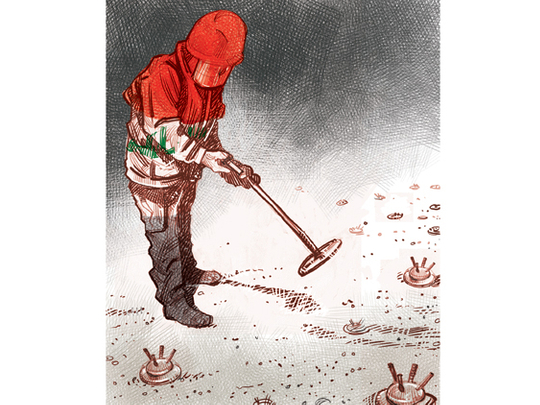
Euphoria about political change in Iraq set in quickly with all Iraqi parties sort of satisfied with the supposedly win-win result of the political standoff that followed the last general election in early May. In a precedent, Iran and Saudi Arabia heeded an American wish to push Iraqi Prime Minister Nouri Al Maliki aside and replace him with another Shiite candidate, Haider Al Abadi. Al Maliki banked on Iranian support until the last moment and claimed to be the man fighting the militant Sunni insurgency in the north by the Islamic State of Iraq and the Levant (Isil) with his Shiite political coalition winning the largest number of seats. The Saudi, American and Iranian pragmatic agreement on replacing Al Maliki implied that he was the cause of all of Iraq’s ills and once he was ousted, recovery would begin. There was little doubt he was part of the mounting problems facing Iraq, but it is truly doubtful if his disappearance from the political scene will be part of any meaningful solution to Iraq’s complicated crisis.
There’s a deep structural crisis in Iraq, and that has been present long before the Anglo-Saxon invasion and occupation more than 10 years ago. More than a decade of siege and intermittent bombing of Saddam Hussain’s regime left the country close to being like Somalia when it came to the state and its institutions. A weakened central government led to the rise of sectarianism and the Americans helped the Kurds to sort of break away from the country, encouraging others to develop similar aspirations. The fabric of society decayed and when the country was invaded it seemed as if the occupiers were just installing a main faction and ousting the other: Replacing Sunni rule with a Shiite one. Sectarianism dominated, and Shiites in power had to work on either reinforcing their links to Iran or trying to develop their own strand (the Al Maliki affair showed the difference between Iraqi Shiite ‘Grand Shaikh’ Ayatollah Ali Al Sistani and Iran’s Shiite ‘spiritual’ leadership).
Shiites in power didn’t act as a dominant faction in a cohesive society, thus their internal difference simmered — though that was less apparent than their struggle with the Sunnis of the country. Almost like the Muslim Brotherhood assuming power in Egypt, any religious-political movement is factional and sectarian and not inclusive. Unfortunately, most Shiite political leaders in Iraq were militant opposition figures acting mainly with a vengeful attitude towards the Sunni population which they identify with the Saddam regime’s brutality. The Anglo-Saxon occupation of Iraq helped further deteriorate society, and affected any potential cohesiveness and inclusiveness in Iraq. It’s also important to note that though Shiite dominance has been problematic, it’s been due to their exposure to power. But Sunnis as well were problematic underdogs in post-Saddam era. Al Qaida-style militants were brought in or emerged from Iraq first to fight the occupation and later to counter Shiite militias. They then moved to Syria following the trail that started in Afghanistan: Being parallel to Anglo-Saxon campaigns against their foes.
Western hype not convincing
Islamist militants appeared synonymous with American and western interests, especially in Muslim countries such as Pakistan, Afghanistan, Syria etc. No conspiracy theory here, as both Sunni and Shiite Muslims turning fundamentalist would be violent militants. The western hype about Isil — to the extent that there is a European or Nato summit to discuss combating — is not convincing. Iraq’s crisis seems irreversible and the US-UK alliance of invasion and occupation is desperate to absolve itself of all responsibility as the main perpetrators of that crisis and as its root cause. The blame is easily laid on militant Islamists and the alternative is to support so-called “moderate” Islamists (the Brotherhood for example), thus keeping predisposing factors for further deterioration.
Al Abadi might manage to form a government that included Sunnis and Kurds with a Shiite majority, and Isil might be pushed back to its original limits (a militant group within a destabilised country without full control on large portions of land) but this is not solving Iraq’s problems. Sectarianism, factionalism, corruption and exclusion are deeply rooted. All those factors need to be addressed and current political figures from all factions, along with regional and international players, will not solve the problem. That will be left to Iraqi people or — to be precise — those who still believe in a unified Iraq and can lead a clearing process and rebuild the country from scratch.
Dr Ahmad Mustafa is an Abu Dhabi-based journalist.










